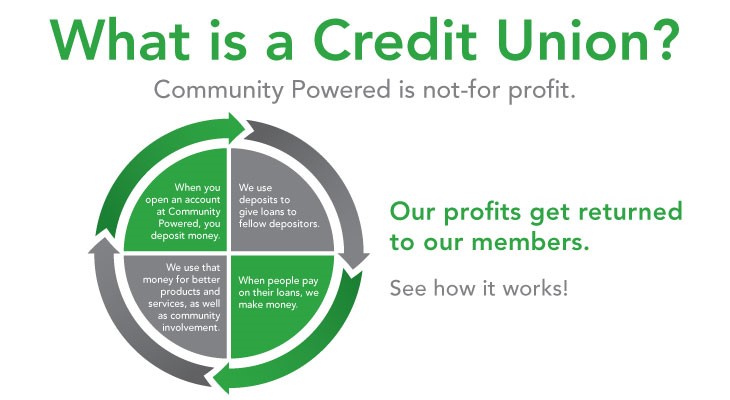Ideal Credit Union in Cheyenne Wyoming: Tailored Financial Services for You
Ideal Credit Union in Cheyenne Wyoming: Tailored Financial Services for You
Blog Article
Opening the Conveniences of Credit Unions: Your Guide
In the realm of financial establishments, credit unions stand as a usually underexplored and distinctive alternative for those looking for an extra personalized technique to financial. As we look into the details of credit history unions, a world of advantages and opportunities unfolds, supplying a look into a monetary landscape where community values and member-focused solutions take center phase. From their humble starts to their modern-day effect, recognizing the essence of lending institution can potentially reshape the means you see and handle your finances.

History of Lending Institution
Debt unions have a rich background rooted in the cooperative activity, going back to the 19th century. The principle of credit unions arised as a feedback to the economic demands of people that were underserved by typical financial institutions. Friedrich Wilhelm Raiffeisen, a German mayor, is often credited with founding the first modern cooperative credit union in the mid-1800s (Credit Union Cheyenne). Raiffeisen established participating loaning societies to help farmers and country neighborhoods access affordable credit and run away the clutches of usurious loan providers.
The concept of people collaborating to merge their resources and give financial aid to each various other spread swiftly across Europe and later on to North America. In 1909, the very first lending institution in the USA was developed in New Hampshire, marking the start of a new age in community-focused financial. Ever since, cooperative credit union have actually remained to focus on the monetary well-being of their participants over revenue, personifying the participating principles of self-help, self-responsibility, democracy, equity, uniformity, and equal rights.
Membership Qualification Requirements
Having established a structure rooted in cooperative concepts and community-focused banking, lending institution keep details subscription qualification criteria to guarantee positioning with their core values and goals. These requirements commonly focus on an usual bond shared by possible participants, which could consist of elements such as geographical location, employer, organizational association, or subscription in a details neighborhood or organization. By needing members to satisfy certain eligibility requirements, credit scores unions intend to cultivate a sense of belonging and shared objective amongst their participants, strengthening the cooperative nature of these banks.
Along with usual bonds, some cooperative credit union might likewise extend subscription eligibility to relative of present members or people who live in the same house. This inclusivity aids debt unions increase their reach while still remaining real to their community-oriented ethos. By maintaining clear and transparent subscription requirements, credit history unions can make sure that their members are proactively participated in supporting the participating values and goals of the establishment.
Financial Products and Solutions
When taking into consideration the array of offerings offered, debt unions provide a diverse range of financial products and services customized to meet the distinct demands of their participants. Participants frequently profit from individualized customer solution, as credit scores unions prioritize building solid connections with those they offer.
In addition, credit unions regularly offer financial education and learning and counseling to aid members improve their financial literacy and make informed choices. Lots of lending institution also participate in common branching networks, enabling members to access their accounts at a range of locations across the country. Overall, the series of monetary product or services supplied by credit unions underscores their dedication to satisfying the diverse requirements of their members while prioritizing their financial wellness.

Benefits Over Traditional Financial Institutions
Showing a distinct technique to economic solutions, credit scores unions use numerous benefits over traditional banks. One vital benefit is that lending institution are typically member-owned, meaning that profits are reinvested into the company to provide better prices and lower fees for members. This participating structure usually brings about a lot more tailored client service, as cooperative credit union focus on member satisfaction over optimizing earnings. Additionally, lending institution are recognized for their affordable passion prices on interest-bearing accounts, fundings, and bank card. This can result in greater returns for members that borrow or conserve money with the credit union contrasted to typical banks.
In addition, lending institution have a tendency to have a strong concentrate on economic education and Wyoming Credit Unions community assistance. They often offer sources and workshops to help participants improve their monetary proficiency and make sound finance decisions (Credit Union Cheyenne WY). By cultivating a feeling of neighborhood and shared goals, credit unions can create a more supportive and inclusive financial environment for their participants
Area Participation and Social Impact

Additionally, cooperative credit union typically companion with neighborhood companies and charities to support different social causes such as budget friendly housing, education, and healthcare. By working together with these entities, cooperative credit union can intensify their social effect and address critical problems affecting their communities. This collective strategy not only benefits those in demand but additionally strengthens the social fabric of the neighborhood by promoting a feeling of unity and assistance amongst its participants. Essentially, credit scores unions offer as drivers for positive change, driving community development and social progress via their energetic participation and impactful efforts.
Verdict
Finally, lending institution have an abundant background rooted in community and collaboration, offering a diverse variety of monetary services and products with affordable rates and personalized client service. They focus on the financial health of their participants over revenue, fostering a feeling of belonging and providing monetary education. By proactively taking part in social impact efforts, cooperative credit union create a comprehensive and helpful financial setting that makes a positive difference in both specific lives and neighborhoods.
Friedrich Wilhelm Raiffeisen, a German mayor, is commonly attributed with establishing the first modern-day credit rating union in the mid-1800s - Credit Union in Cheyenne Wyoming. By calling for participants to satisfy certain qualification needs, credit scores unions intend to cultivate a sense of belonging and shared purpose among their participants, enhancing the participating nature of these monetary organizations
Additionally, credit score unions regularly offer economic education and counseling to aid members improve their financial literacy and make informed choices. Generally, the array of financial products and services used by credit rating unions emphasizes their dedication to satisfying the varied demands of their members while prioritizing their financial wellness.
In addition, debt unions are understood for their affordable interest rates on cost savings accounts, fundings, and debt cards.
Report this page